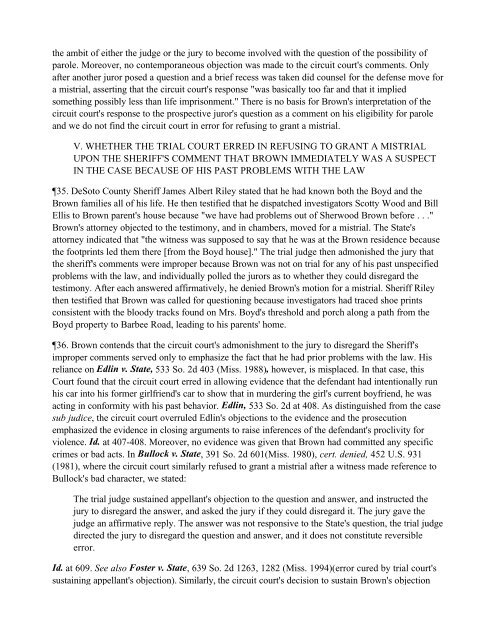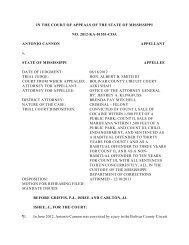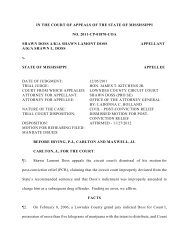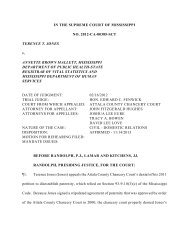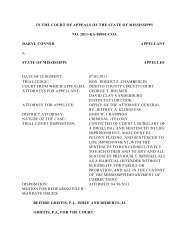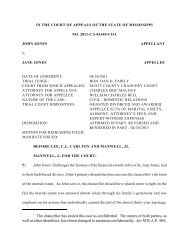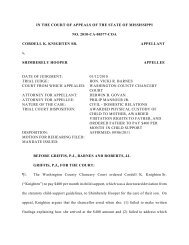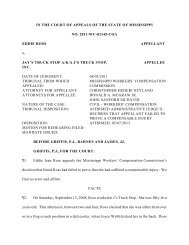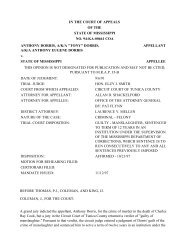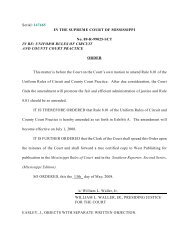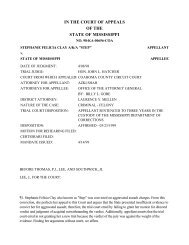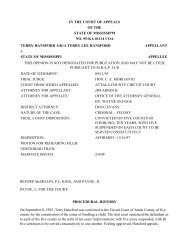IN THE SUPREME COURT OF MISSISSIPPI NO. 95-DP ... - Justia
IN THE SUPREME COURT OF MISSISSIPPI NO. 95-DP ... - Justia
IN THE SUPREME COURT OF MISSISSIPPI NO. 95-DP ... - Justia
You also want an ePaper? Increase the reach of your titles
YUMPU automatically turns print PDFs into web optimized ePapers that Google loves.
the ambit of either the judge or the jury to become involved with the question of the possibility of<br />
parole. Moreover, no contemporaneous objection was made to the circuit court's comments. Only<br />
after another juror posed a question and a brief recess was taken did counsel for the defense move for<br />
a mistrial, asserting that the circuit court's response "was basically too far and that it implied<br />
something possibly less than life imprisonment." There is no basis for Brown's interpretation of the<br />
circuit court's response to the prospective juror's question as a comment on his eligibility for parole<br />
and we do not find the circuit court in error for refusing to grant a mistrial.<br />
V. WHE<strong>THE</strong>R <strong>THE</strong> TRIAL <strong>COURT</strong> ERRED <strong>IN</strong> REFUS<strong>IN</strong>G TO GRANT A MISTRIAL<br />
UPON <strong>THE</strong> SHERIFF'S COMMENT THAT BROWN IMMEDIATELY WAS A SUSPECT<br />
<strong>IN</strong> <strong>THE</strong> CASE BECAUSE <strong>OF</strong> HIS PAST PROBLEMS WITH <strong>THE</strong> LAW<br />
35. DeSoto County Sheriff James Albert Riley stated that he had known both the Boyd and the<br />
Brown families all of his life. He then testified that he dispatched investigators Scotty Wood and Bill<br />
Ellis to Brown parent's house because "we have had problems out of Sherwood Brown before . . ."<br />
Brown's attorney objected to the testimony, and in chambers, moved for a mistrial. The State's<br />
attorney indicated that "the witness was supposed to say that he was at the Brown residence because<br />
the footprints led them there [from the Boyd house]." The trial judge then admonished the jury that<br />
the sheriff's comments were improper because Brown was not on trial for any of his past unspecified<br />
problems with the law, and individually polled the jurors as to whether they could disregard the<br />
testimony. After each answered affirmatively, he denied Brown's motion for a mistrial. Sheriff Riley<br />
then testified that Brown was called for questioning because investigators had traced shoe prints<br />
consistent with the bloody tracks found on Mrs. Boyd's threshold and porch along a path from the<br />
Boyd property to Barbee Road, leading to his parents' home.<br />
36. Brown contends that the circuit court's admonishment to the jury to disregard the Sheriff's<br />
improper comments served only to emphasize the fact that he had prior problems with the law. His<br />
reliance on Edlin v. State, 533 So. 2d 403 (Miss. 1988), however, is misplaced. In that case, this<br />
Court found that the circuit court erred in allowing evidence that the defendant had intentionally run<br />
his car into his former girlfriend's car to show that in murdering the girl's current boyfriend, he was<br />
acting in conformity with his past behavior. Edlin, 533 So. 2d at 408. As distinguished from the case<br />
sub judice, the circuit court overruled Edlin's objections to the evidence and the prosecution<br />
emphasized the evidence in closing arguments to raise inferences of the defendant's proclivity for<br />
violence. Id. at 407-408. Moreover, no evidence was given that Brown had committed any specific<br />
crimes or bad acts. In Bullock v. State, 391 So. 2d 601(Miss. 1980), cert. denied, 452 U.S. 931<br />
(1981), where the circuit court similarly refused to grant a mistrial after a witness made reference to<br />
Bullock's bad character, we stated:<br />
The trial judge sustained appellant's objection to the question and answer, and instructed the<br />
jury to disregard the answer, and asked the jury if they could disregard it. The jury gave the<br />
judge an affirmative reply. The answer was not responsive to the State's question, the trial judge<br />
directed the jury to disregard the question and answer, and it does not constitute reversible<br />
error.<br />
Id. at 609. See also Foster v. State, 639 So. 2d 1263, 1282 (Miss. 1994)(error cured by trial court's<br />
sustaining appellant's objection). Similarly, the circuit court's decision to sustain Brown's objection


